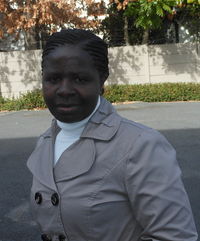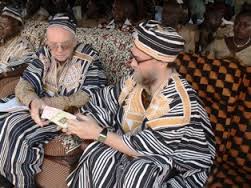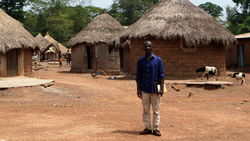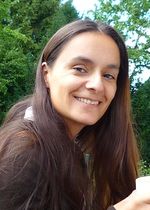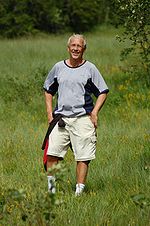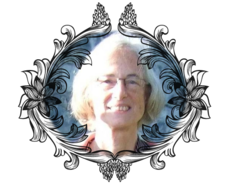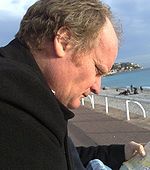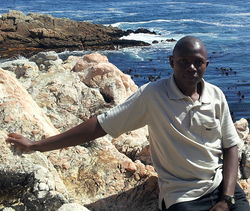Difference between revisions of "Advisory Board"
(→Medadi Ssentanda) |
|||
| (56 intermediate revisions by 8 users not shown) | |||
| Line 1: | Line 1: | ||
| − | The TypeCraft Advisory Board are linguists who have agreed to | + | The TypeCraft Advisory Board are linguists who have agreed to answer questions of TypeCraft users concerning their annotations or their work on the TypeCraft wiki, and to provide guidance to the team of TypeCraft developers. |
==Biographies== | ==Biographies== | ||
| − | ===[[User: | + | ===[[User:Allen Asiimwe|Allen Asiimwe]]=== |
| + | [[Image:Allen2014.JPG|thumb|200px|left|Allen Asiimwe]] | ||
| + | ''Expert for [http://www.ethnologue.com/country/Ug/languages/***EDITION*** Runyakitara]'' | ||
| + | |||
| + | Allen Asiimwe teaches in the Department of African Languages at Makerere University, Kampala. She holds a Master of Philosophy (Linguistics) from the Norwegian University of Science and Technology, Norway. Allen graduated with a PhD in African Languages from Stellenbosch University, South Africa. The title of her dissertation is "Definiteness and Specificity in Runyankore-Rukiga" (her dissertation can be accessed by following this link: http://scholar.sun.ac.za/handle/10019.1/95926). Runyankore-Rukiga is a Bantu language cluster of Uganda. | ||
| + | Her interests are in the areas of morphology and syntax of Bantu languages. She also has a passion for the language description and documentation of the lesser-studied Bantu Languages of Uganda. | ||
| + | |||
| − | [ | + | ===[[User:Thomas Bearth|Thomas Bearth]]=== |
| + | [[Image:ThomasBearth1.jpeg|thumb|400px|right |Prof.Bearth - to the left]] | ||
| + | Professor Bearth is an emeritus from the University of Zürich. His research interest are: | ||
| − | + | * Syntax of natural language, discourse studies, | |
| + | * Pragmatics with special emphasis on information structure, tonology, lexicology; | ||
| + | * Language as a factor of development; | ||
| + | * Human language technologies in the teaching of African languages. | ||
| − | + | Languages/areas of special interest: | |
| + | * [http://www.ethnologue.com/subgroups/mande Eastern Mande] ([http://www.ethnologue.com/subgroups/tura-dan-mano Tura and Dan] | ||
| + | * [http://glottolog.org/resource/languoid/id/krua1234 Kru (Wobe-Guere) ] | ||
| + | * [http://www.ethnologue.com/language/aka/view/***EDITION*** Akan], | ||
| − | + | Bantu: | |
| − | + | *[http://www.ethnologue.com/language/swh/view/***EDITION*** Swahili], | |
| + | *[http://www.ethnologue.com/language/dua/view/***EDITION*** Duala], | ||
| + | *[http://www.ethnologue.com/country/ug/languages Languages of Uganda]. | ||
| − | + | More information about Emeritus Professor Bearth you can find on his [[User: Thomas Bearth|TypeCraft user page]] | |
| − | [[ | + | |
| − | + | ||
| + | ===[[User:Joseph Bogny|Joseph Bogny]]=== | ||
| − | + | ''Expert for the [https://www.ethnologue.com/country/CI/languages langage de Côte d'Iviore]'' | |
| − | + | [[Image:Bogny.jpg|thumb|250px|left|Mbre village in the north of Côte d'Ivoire]] | |
| − | + | Joseph Y. BOGNY est enseignant-chercheur au département des Sciences du Langage et à l’Institut de Linguistique Appliquée (ILA) de l’Université Félix Houphouët-Boigny de Cocody-Abidjan, en Côte d’Ivoire. Il enseigne la syntaxe et la linguistique historique et comparative. Ses recherches portent sur les langues Kwa et s’inscrivent dans le cadre théorique de la grammaire générative, notamment dans le programme minimaliste. Il s’intéresse aussi à l’interface syntaxe-phonologie dans les langues Niger-Congo. Il est membre du Laboratoire des Théories et Modèles Linguistiques (LTML). | |
| − | + | ||
| − | + | ||
| − | + | ||
| − | + | ||
| − | |||
| − | |||
| − | |||
| − | |||
| − | + | ===[[User:Vera Ferreira|Vera Ferreira]]=== | |
| − | + | ||
| − | + | ||
| − | + | ||
| − | + | ||
| − | + | ||
| + | ''Expert in Language Documentation and Revitalisation''' | ||
| + | [[Image:Vera_Ferreira.jpeg|thumb|150px|right|Vera Ferreira]] | ||
| + | After taking the licentiate degree in English and German Studies at the University of Coimbra (Portugal, 1999) and getting an M.A. degree in General Linguistics and Linguistic Typology at the Ludwig-Maximilian-University in Munich (Germany, 2000), Ferreira started her PhD in General Linguistics at the Ludwig-Maximilian-University and specialized in Language Documentation and endangered languages in Europe. | ||
| + | Since 2007, Ferreira gives courses on Language Documentation and endangered languages at the Institute for General Linguistics and Language Typology (Ludwig-Maximilian-University) in Munich. In one of these courses, she developed a multimedia dictionary of Bavarian. From 2008 to 2012, she was responsible for the documentation of Minderico within the DoBeS project financed by the Volkswagen Foundation at the University of Regensburg. | ||
| + | Vera Ferreira is the president of CIDLeS – Centro Interdisciplinar de Documentação Linguística e Social (Minde, Portugal) and head of its Language Documentation and Language Typology group. She is involved in several projects focusing on the documentation and study of minority/endangered languages in Europe. She holds seminars and workshops on language documentation, fieldwork, endangered languages and language typology. She is one of the Portuguese delegates of the COST Action "New Speakers in a Multilingual Europe: Opportunities and Challenges" (IS1306). | ||
| − | === | + | ===[[User:Lars Hellan|Lars Hellan]] === |
| − | [http://en.wikipedia.org/wiki/ | + | [[Image:LarsByM.jpg|thumb|150px|left|Lars Hellan]] |
| + | [http://en.wikipedia.org/wiki/North_Germanic_languages North Germanic Languages] | ||
| − | + | With some background in philology and philosophy, he was brought up as an early-generation generative grammarian, with Norwegian as main field. Being theoretically first oriented towards Government-Binding theory and Montague Grammar, he later - late 90ies - moved more towards constraint-based frameworks such as HPSG, and got interested in computational grammar implementation. Since early 90ies he has also been interested in typologically oriented research. | |
| − | + | (More details can be seen on [[User:Lars Hellan]].) | |
| + | |||
| − | |||
| − | |||
| − | For | + | |
| − | + | ||
| − | + | ||
| − | + | ===[[User:Mary Esther Kropp Dakubu|Mary Esther Kropp Dakubu]] === | |
| − | + | ||
| − | + | {| | |
| + | |'''<nowiki>*</nowiki>27. April 1938; Boston, Mass. U.S.A''' | ||
| + | | '''† 17.November 2016; Boston, Mass. U.S.A''' | ||
| + | |- | ||
| + | |} | ||
| + | |||
| + | |||
| + | [http://www.ethnologue.com/show_country.asp?name=GH Languages of Ghana] | ||
| + | |||
| + | [[Image:ME2.png|230px|right|Mary Esther Kropp Dakubu|]] | ||
| + | |||
| + | Mary Esther Kropp Dakubu has been working on languages of West Africa, particularly languages spoken in Ghana, since about 1962, and has been associated with the University of Ghana since 1964. She received her PhD in West African Languages from the School of Oriental and African Studies, University of London, after a BA (English and Philosophy) from Queen's University, Kingston ON Canada and an MA in Linguistics from the University of Pennsylvania. Since 2012 she has been editor-in-chief of the Ghana Journal of Linguistics, and since 2013 Chief Coordinator of the University of Ghana Readers Project. For her (relatively) recent publications follow [[User:Mary Esther Kropp Dakubu|this link to her user page ]] | ||
| + | |||
| + | ===Sebastian Nordhoff=== | ||
| + | Sebastian Nordhoff studied computational linguistics and general | ||
| + | linguistics. His main interests are grammar and using computational | ||
| + | tools for language description. On the grammar side, he has authored "A | ||
| + | grammar of Upcountry Sri Lanka Malay", while on the technological side, | ||
| + | he edited "Linked Data in Linguistics" together with Sebastian Hellmann | ||
| + | and [http://www.sfb632.uni-potsdam.de/~chiarcos/ Christian Chiarcos]. Both interests converge in | ||
| + | "[http://nflrc.hawaii.edu/ldc/sp04/ Electronic Grammaticography]", published as a special publication of Language | ||
| + | Documentation & Conservation. | ||
| + | |||
| + | He is currently working on changing the publishing model in linguistcs | ||
| + | towards the Open Access paradigm, at Language Science Press, and as a | ||
| + | freelancer, where he advises linguists on how to store, process and | ||
| + | publish their data. | ||
| + | |||
| + | |||
===Marc van Oostendorp=== | ===Marc van Oostendorp=== | ||
[http://en.wikipedia.org/wiki/Phonology Phonology] | [http://en.wikipedia.org/wiki/Phonology Phonology] | ||
| Line 71: | Line 107: | ||
[[Image:Marc.jpg|thumb|150px|left|Marc van Oostendorp]] | [[Image:Marc.jpg|thumb|150px|left|Marc van Oostendorp]] | ||
| − | Marc van Oostendorp | + | Marc van Oostendorp is not only a phonologist who works for the Meertens Institute in Amsterdam and a professor at the University of Leiden, but also a 'internet pioneer'. He has built for example the project [http://cf.hum.uva.nl/dsp/ljc/english.html Laurens Janszoon Coster], a comprehensive on-line collection of Dutch literary masterpieces, and is currently working on [http://www.taalmeldpunt.nl/ Meldpunt Taal], a website where laymen can share their observations on language variation and change with researchers. |
| − | He | + | He has also studied [http://www.ipernity.com/home/58613 Esperanto]. |
| − | In phonology Marc works on phonological microvariation, that is, the study of those phonological features that determine the differences between dialects or social classes. | + | In phonology, Marc works mostly on phonological microvariation, that is, the study of those phonological features that determine the differences between dialects or social classes. Furthermore, he is the editor-in-chief of the [http://www.companiontophonology.com/ Companion to Phonology], to appear in 2011 with Blackwell. |
| − | + | ||
| − | + | ||
| − | + | ||
| − | + | ===[[User:Medadi_Erisa_Ssentanda|Medadi Ssentanda]]=== | |
| − | + | ||
| − | + | ''Expert for [http://www.ethnologue.com/country/Ug/languages/***EDITION*** Luganda]'' | |
| − | + | ||
| − | + | ||
| − | === | + | |
| − | |||
| − | [[Image: | + | [[Image:Medadi.jpg|thumb|250px|left|Medadi Ssentanda]] |
| − | + | Medadi E Ssentanda teaches in the [[School_of_Languages,_Literature_and_Communication_-_Makerere_University|Department of African Languages at Makerere University]]. He has a PhD in Applied (General) Linguistics from Stellenbosch University, South Africa. he is a reader in early literacy development. Also, as a linguist, he is interested in the morphology of Luganda, his mother tongue. | |
| − | University | + | |
| − | + | ||
| − | + | ||
| − | + | ||
| − | + | ||
| − | + | ||
Latest revision as of 17:49, 18 November 2016
The TypeCraft Advisory Board are linguists who have agreed to answer questions of TypeCraft users concerning their annotations or their work on the TypeCraft wiki, and to provide guidance to the team of TypeCraft developers.
Contents
Biographies
Allen Asiimwe
Expert for Runyakitara
Allen Asiimwe teaches in the Department of African Languages at Makerere University, Kampala. She holds a Master of Philosophy (Linguistics) from the Norwegian University of Science and Technology, Norway. Allen graduated with a PhD in African Languages from Stellenbosch University, South Africa. The title of her dissertation is "Definiteness and Specificity in Runyankore-Rukiga" (her dissertation can be accessed by following this link: http://scholar.sun.ac.za/handle/10019.1/95926). Runyankore-Rukiga is a Bantu language cluster of Uganda. Her interests are in the areas of morphology and syntax of Bantu languages. She also has a passion for the language description and documentation of the lesser-studied Bantu Languages of Uganda.
Thomas Bearth
Professor Bearth is an emeritus from the University of Zürich. His research interest are:
- Syntax of natural language, discourse studies,
- Pragmatics with special emphasis on information structure, tonology, lexicology;
- Language as a factor of development;
- Human language technologies in the teaching of African languages.
Languages/areas of special interest:
Bantu:
More information about Emeritus Professor Bearth you can find on his TypeCraft user page
Joseph Bogny
Expert for the langage de Côte d'Iviore
Joseph Y. BOGNY est enseignant-chercheur au département des Sciences du Langage et à l’Institut de Linguistique Appliquée (ILA) de l’Université Félix Houphouët-Boigny de Cocody-Abidjan, en Côte d’Ivoire. Il enseigne la syntaxe et la linguistique historique et comparative. Ses recherches portent sur les langues Kwa et s’inscrivent dans le cadre théorique de la grammaire générative, notamment dans le programme minimaliste. Il s’intéresse aussi à l’interface syntaxe-phonologie dans les langues Niger-Congo. Il est membre du Laboratoire des Théories et Modèles Linguistiques (LTML).
Vera Ferreira
Expert in Language Documentation and Revitalisation'
After taking the licentiate degree in English and German Studies at the University of Coimbra (Portugal, 1999) and getting an M.A. degree in General Linguistics and Linguistic Typology at the Ludwig-Maximilian-University in Munich (Germany, 2000), Ferreira started her PhD in General Linguistics at the Ludwig-Maximilian-University and specialized in Language Documentation and endangered languages in Europe. Since 2007, Ferreira gives courses on Language Documentation and endangered languages at the Institute for General Linguistics and Language Typology (Ludwig-Maximilian-University) in Munich. In one of these courses, she developed a multimedia dictionary of Bavarian. From 2008 to 2012, she was responsible for the documentation of Minderico within the DoBeS project financed by the Volkswagen Foundation at the University of Regensburg. Vera Ferreira is the president of CIDLeS – Centro Interdisciplinar de Documentação Linguística e Social (Minde, Portugal) and head of its Language Documentation and Language Typology group. She is involved in several projects focusing on the documentation and study of minority/endangered languages in Europe. She holds seminars and workshops on language documentation, fieldwork, endangered languages and language typology. She is one of the Portuguese delegates of the COST Action "New Speakers in a Multilingual Europe: Opportunities and Challenges" (IS1306).
Lars Hellan
With some background in philology and philosophy, he was brought up as an early-generation generative grammarian, with Norwegian as main field. Being theoretically first oriented towards Government-Binding theory and Montague Grammar, he later - late 90ies - moved more towards constraint-based frameworks such as HPSG, and got interested in computational grammar implementation. Since early 90ies he has also been interested in typologically oriented research.
(More details can be seen on User:Lars Hellan.)
Mary Esther Kropp Dakubu
| *27. April 1938; Boston, Mass. U.S.A | † 17.November 2016; Boston, Mass. U.S.A |
Mary Esther Kropp Dakubu has been working on languages of West Africa, particularly languages spoken in Ghana, since about 1962, and has been associated with the University of Ghana since 1964. She received her PhD in West African Languages from the School of Oriental and African Studies, University of London, after a BA (English and Philosophy) from Queen's University, Kingston ON Canada and an MA in Linguistics from the University of Pennsylvania. Since 2012 she has been editor-in-chief of the Ghana Journal of Linguistics, and since 2013 Chief Coordinator of the University of Ghana Readers Project. For her (relatively) recent publications follow this link to her user page
Sebastian Nordhoff
Sebastian Nordhoff studied computational linguistics and general linguistics. His main interests are grammar and using computational tools for language description. On the grammar side, he has authored "A grammar of Upcountry Sri Lanka Malay", while on the technological side, he edited "Linked Data in Linguistics" together with Sebastian Hellmann and Christian Chiarcos. Both interests converge in "Electronic Grammaticography", published as a special publication of Language Documentation & Conservation.
He is currently working on changing the publishing model in linguistcs towards the Open Access paradigm, at Language Science Press, and as a freelancer, where he advises linguists on how to store, process and publish their data.
Marc van Oostendorp
Marc van Oostendorp is not only a phonologist who works for the Meertens Institute in Amsterdam and a professor at the University of Leiden, but also a 'internet pioneer'. He has built for example the project Laurens Janszoon Coster, a comprehensive on-line collection of Dutch literary masterpieces, and is currently working on Meldpunt Taal, a website where laymen can share their observations on language variation and change with researchers. He has also studied Esperanto.
In phonology, Marc works mostly on phonological microvariation, that is, the study of those phonological features that determine the differences between dialects or social classes. Furthermore, he is the editor-in-chief of the Companion to Phonology, to appear in 2011 with Blackwell.
Medadi Ssentanda
Expert for Luganda
Medadi E Ssentanda teaches in the Department of African Languages at Makerere University. He has a PhD in Applied (General) Linguistics from Stellenbosch University, South Africa. he is a reader in early literacy development. Also, as a linguist, he is interested in the morphology of Luganda, his mother tongue.
